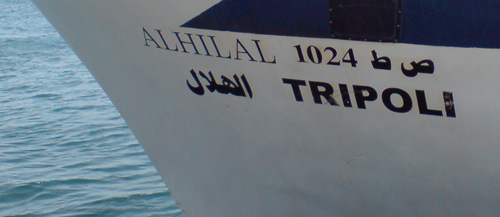
Sometimes you turn up somewhere for the first time in a while and you realise something is different, and you search for an answer why the change took place. I’ve been to the French port town of Sète, in Languedoc, every year between 1990 and 2000, and every couple of years since then. Never before do I remember seeing a single fishing trawler of any nationality other than French – indeed I don’t even recall any fishing vessels not registered in the port of Sète.
Yet when I was there last week there was a marked change. Overall there were plenty of fishing vessels in port, and probably a third of those moored were registered in Tripoli, Libya. It’s hard to judge the provenance of the sailors on board these boats, but the boats themselves were also markedly different from the norm – the larger vessels registered in Tripoli had lower bows than the French vessels, and more decks with rooms.
So that brings me to the real issue: what were all of these boats from Tripoli doing in Sète? My efforts to investigate the matter have left me rather confused. An article at AgoraVox in French states “En entrant dans le port de Sète, il m’indique des thoniers, à quai, qui ont été achetés et immatriculés à Tripoli en Libye, ce qui permet à leurs propriétaires d’échapper aux réglementations européennes…” but it’s not made clear quite what rules we mean. Standards of how the ships are built and maintained? Or in what waters they are allowed to fish? There’s a further short entry on the French blog Maîtres du Vent where it’s speculated that the North African vessels are being used to catch tuna in African coastal waters (outside the scope of the Common Fisheries Policy), with the fish then being landed in Europe.
There’s a little on Wikipedia’s page about the Common Fisheries Policy about EU-Africa relations regarding fish, while the map at Wikipedia seems to show that the Tripoli registered vessels would still have to abide by EU fishing quotas in the marked areas. The EU is also a member of the General Fisheries Commission for the Mediterranean but there’s no clear answer there to the issue of the boats from Tripoli.
Any answers to this conundrum are most welcome in the comments!







